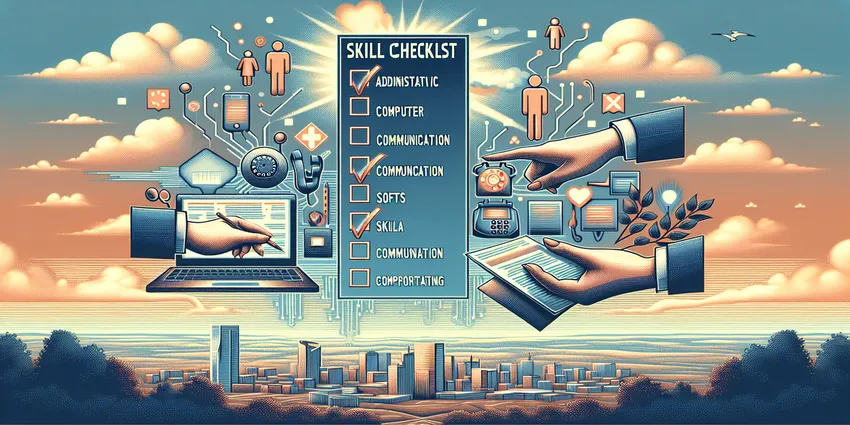Receptionist Skill Checklist: Key Takeaways
- Proficiency in office software and telephone systems is fundamental for managing daily administrative tasks efficiently.
- Strong soft skills like communication, multitasking, and adaptability are crucial to providing excellent customer service.
- A balance of technical and interpersonal abilities enables receptionists to handle diverse challenges and enhance organizational success.
The role of a receptionist demands a unique blend of technical and soft skills to excel. This checklist outlines the essential competencies needed to perform effectively.
From mastering office software to displaying professionalism, receptionist skills play a vital role in workplace efficiency and client satisfaction.
1. Technical Skills Receptionists Need to Excel
Receptionists must be adept in several technical areas to manage their responsibilities smoothly. Mastery of office software programs such as Microsoft Word, Excel, Outlook, and PowerPoint is critical for creating documents, managing data, and scheduling appointments effectively.
Efficient management of telephone systems, often multi-line, forms another important aspect. This includes answering, transferring, and placing calls on hold with professional telephone etiquette ensuring seamless communication.
Experience with appointment scheduling software supports managing booking calendars and avoiding scheduling conflicts. Familiarity with Customer Relationship Management (CRM) tools helps maintain accurate client records and improve service delivery.
Operational knowledge of office equipment like printers, copiers, fax machines, and scanners is also necessary. Basic troubleshooting skills enable receptionists to resolve minor technical issues quickly, helping maintain smooth office operations.
Employers can find useful advice on hiring the right receptionist with this guide on how to hire a receptionist.
2. Soft Skills for Receptionists to Provide Excellent Service
Technical expertise alone isn't enough to be an exceptional receptionist. Superior communication skills—both verbal and written—are fundamental to interacting effectively with clients, visitors, and colleagues.
Organizational abilities enable receptionists to handle multiple tasks, maintain tidy records, and keep the reception area orderly. Multitasking skills are vital to balancing phone calls, guest services, and administrative duties simultaneously without sacrificing quality.
A strong customer service orientation ensures every visitor receives a positive, welcoming experience. Problem-solving skills help quickly address and resolve issues as they arise.
Effective time management makes it possible to prioritize workload efficiently and meet deadlines. Interpersonal skills foster positive relationships through friendly and professional interactions.
Adaptability is essential for receptionists to handle unexpected challenges or shifting priorities with grace. Attention to detail guarantees accuracy in tasks like data entry, scheduling, and message taking, preventing costly errors.
Finally, professionalism—demonstrated by punctuality, appropriate dress, and ethical behavior—creates a trustworthy presence that reflects well on the entire organization.
For those entering the receptionist role, exploring common receptionist interview questions can be invaluable preparation.
3. Integrating Technical and Soft Skills for Receptionist Success
The combination of technical know-how and interpersonal talent empowers receptionists to contribute positively across various domains. Technical skills help complete tasks efficiently, while soft skills build meaningful relationships and foster a welcoming environment.
By continually developing these skills, receptionists can better anticipate needs, communicate clearly, and adapt to changing circumstances—all of which are key to organizational success.
Investing in both skill sets not only enhances daily operations but also supports career growth and job satisfaction.
4. Practical Steps to Develop Receptionist Skills
To enhance your reception skills, consider the following actionable strategies:
- Take training courses focused on office software and telephone system management.
- Practice written and verbal communication in professional contexts.
- Use scheduling and CRM tools regularly to build familiarity and efficiency.
- Engage in role-playing exercises to improve customer service and multitasking capabilities.
- Seek feedback from supervisors and colleagues to refine interpersonal and organizational skills.
- Stay updated on industry best practices and new technologies impacting front-desk operations.
5. Resources for Receptionist Skill Development
Employers and aspiring receptionists can leverage the following resources for skill enhancement and certification:
- CVzen – Top Skills for Front Desk Receptionists
- ResumeDesign – Receptionist Resume Skills
- TimesPro – Receptionist Skills to Excel in the Job
Receptionist Skill Checklist: Conclusion
Excelling as a receptionist requires a well-rounded skill set combining essential technical competencies with strong interpersonal abilities. Mastery of office software and equipment, along with excellent communication, organizational, and customer service skills, creates a successful receptionist profile.
Developing and refining these skills equips receptionists to handle diverse tasks and challenges effectively, ensuring smooth front desk operations and a positive experience for every visitor.










Loading comments...